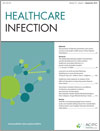
Healthcare Infection
Volume 18 Number 3 2013
HI13017The provision of infection prevention and control services in the public health sector in New Zealand
Infection prevention and control services are well established in New Zealand hospitals. There are currently three national programs which are expected to be implemented within all 20 District Health Boards. Successful delivery of the programs requires adequately resourced and skilled teams.
HI13010The relationship between patient characteristics and the development of a multi-resistant healthcare-associated infection in a private South Australian hospital
Healthcare associated infections with multi-resistant organisms (MRO-HAI) are of great concern in the provision of healthcare. This study aimed to identify the risk factors for MRO HAI and found the prevention of UTI in patients with underlying renal disease could be an important factor in reducing MRO transmission. The findings can be applied to different hospital settings in the public and private sectors to assist with MRO HAI prevention.
HI13010 Abstract | HI13010 Full Text | HI13010PDF (153 KB) Open Access Article
HI12062Long-term survival outcome following Staphylococcus aureus bacteraemia
This study describes long-term survival following Staphylococcus aureus bacteraemia (SAB), for which data is very limited. Deaths continue for many months after SAB and poorer survival occurs in those with older age, unknown focus of infection and not admitted under the Infectious Diseases team. Short-term follow-up studies may miss large numbers of SAB-associated deaths, so more long-term studies are required.
HI12062 Abstract | HI12062 Full Text | HI12062PDF (317 KB) Open Access Article
HI12050Healthcare waste disposal: an analysis of the effect of education on improving waste disposal
Improvements in healthcare waste disposal could considerably reduce environmental and financial impacts. A waste audit was conducted to gain a greater understanding of approaches for waste disposal behaviour change. The audit showed 41% clinical waste in clinical waste bins with a questionable minor improvement post staff education. This demonstrates that multiple approaches are needed for sustainable waste management.
HI11025Vancomycin-resistant enterococci surveillance of intensive care patients: incidence and outcome of colonisation
Vancomycin-resistant enterococci (VRE) colonisations serve as a reservoir and increase the risk of patients developing an infection with VRE leading to treatment difficulties. The aim of this study was to identify the incidence of VRE colonisation in ICU and patient outcomes as a result of acquisition of VRE in ICU. Having determined the acquisition rates in ICU the question was raised as to whether implementation of chlorhexidine washes would be effective; however, this has not yet been tried at The Canberra Hospital.
HI13002Shelf life of sterilized packaged items stored in acute care hospital settings: factors for consideration
Reusable medical devices are sterilized and stored in hospitals until required. Expiry dates are allocated to commercially sterilized devices and should be followed. For devices sterilized in hospital-based Central Sterilization Departments, many factors will determine allocation of expiry date (time-related shelf life) or no expiry date with re-sterilization of device only if exposed to an event (event-related sterility).

